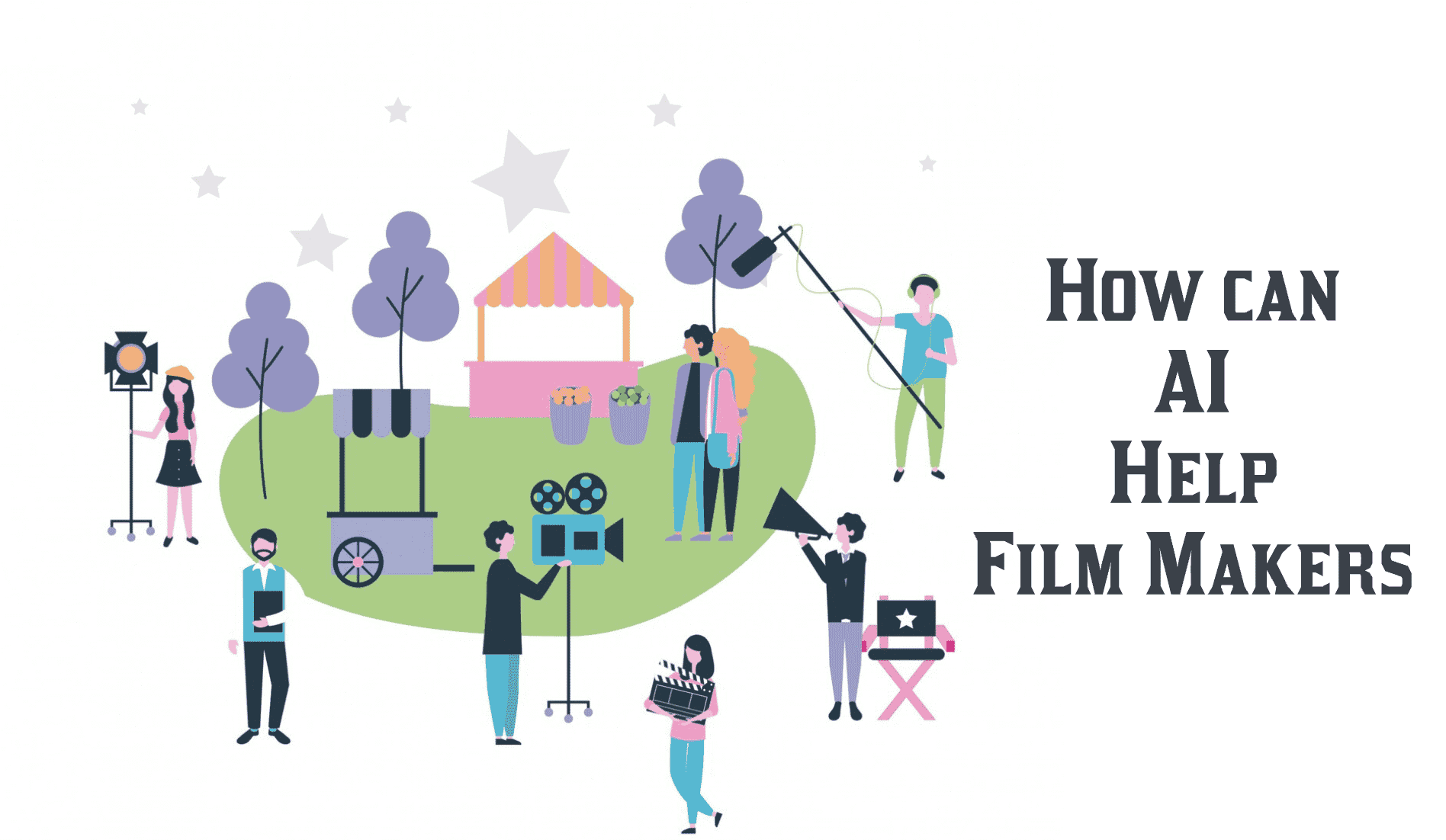
When it comes to making movies, you need a lot to consider. Some decisions are obvious, but others may not be so clear. How can you make sure your movie will be a success? What technology should you use? How valuable is the right cut of footage? If you’re wondering how AI could help executives and filmmakers alike, Artificial intelligence can help filmmakers and executives who need to achieve stunning visual effects while keeping panache.
Artificial Intelligence can help film makers by saving time, improving process through critical insights on audience preference, engagement, production decisions, content creation and distribution. It can also be used to deal with legal challenges that film makers face and make the creative licensing a much easier process.
This article will give a guide to how can AI help film makers:
Table of contents
Also Read: 10 Movies That Get Artificial Intelligence Right
How is AI Changing The Film Industry?
The film industry is one of the most creative industries in the world, but it has been challenged by technology in recent years. Artificial intelligence (AI) has been a major factor in this challenge. AI can increase the efficiency and productivity of companies and individuals, but it can also significantly change how people work. AI has already changed many aspects of our lives, from communicating to shopping for products and services. AI is so widespread that it has become difficult to imagine life without it. However, there are some security concerns when it comes to AI. Many executives in the film industry believe that there are no clear guidelines on how to handle this technology. Below will discuss ways that AI is changing the film industry:
AI Helps Filmmakers Save Time
Filmmakers spend much time and effort on pre-production, production, post-production, and distribution. These processes can take up to five years to complete before a film gets released in theaters. However, artificial intelligence can help speed up this process by automating many tasks that traditionally require human effort. For example, an AI system could be used to research new projects or help with casting decisions by analyzing thousands of resumes from actors looking for roles in movies or TV shows. AI systems also allow filmmakers to analyze data from previous projects so they can better predict what will happen next based on past successes or failures.
AI Is Making Filmmaking More Efficient
AI has the potential to make filmmaking more efficient and cost-effective. AI can help filmmakers make better movies with less effort and time. It can also be used in the editing room to edit footage faster. This is especially useful for projects with a lot of footage or multiple shots. For example, if you want to create a documentary about a specific topic, you may need to shoot many angles of your subject matter. With AI tools, you could use the same shot multiple times throughout the documentary without re-shooting each time.
AI Is Changing the Way Films Are Made Based on Audience Preferences
Filmmakers are also using artificial intelligence to change how their movies are based on audience preferences. For example, suppose there’s a movie that isn’t performing well at the box office (or even worse). In that case, AI could be used to analyze data from past performances and determine which scenes/characters/locations were not liked by audiences or which scenes/characters/locations were liked by audiences but did not perform well at the box office (and therefore were cut out of future productions).
AI Help Filmmakers Make Better Movies With Less Effort
AI is helping filmmakers make better movies with less effort. When it comes to the technical side of filmmaking, there’s still a lot of work that needs to be done. That’s why AI can help. It can take the guesswork out of things like lighting and camera settings, as well as editing and color correction. AI can also help you find new ways to tell stories using technology. For example, if you want to shoot an intimate scene but don’t have enough space for two actors to move around freely, AI can suggest an alternate angle that would give the same effect but be more cinematic.
AI Helps Executives Trust Artificial Intelligence
Artificial intelligence (AI) is one of the most important tools in today’s business world. It helps executives make decisions more efficiently and improves communications across departments by eliminating ambiguity in written messages and emails. As companies grow more complex, they need a way to communicate with their employees more effectively than ever before. AI solutions offer this solution by automating decision-making processes and increasing employee productivity by reducing repetitive tasks and providing relevant information at the right time. Hence, everyone stays informed about what’s happening at all times.
Also Read: AI: What should the C-suite know?
But How Can AI Change the Entire Process of Filmmaking?
Artificial Intelligence (AI) has been used in filmmaking to a greater extent. The new technology has been able to change the entire process of filmmaking and filmmaking. The most common use of AI in filmmaking is using the computer to help with editing. AI can make it easier for filmmakers to edit their movies. AI can help filmmakers with other aspects of their job, such as finding actors or creating new scenes for their movies. AI can also help with other aspects of filmmaking, such as finding locations for your movie and even creating new sets for your movie. Artificial Intelligence is becoming more popular because it can do tasks humans cannot do alone. This makes it easier for filmmakers looking for ways to save time while working on their projects. Artificial Intelligence has made it possible for filmmakers to save money on location scouting trips or hiring actors by allowing them to do it all online instead of having to make multiple trips around town or even out of town altogether! Below will discuss ways that artificial intelligence can change the entire process of filmmaking.
AI Can Help With Creative Decisions
AI can be used to make creative decisions in filmmaking. This means that it can analyze the content of a film, determine what is important and what isn’t, and determine how to execute it effectively. The AI system will create a script unique to the director’s vision. For example, an AI system may be able to analyze one film and determine how to make it better by analyzing other films and how they were created. It might also suggest ways for filmmakers to improve their craft or style of filmmaking.
AI Can Help With Production Decisions
The second way that AI can change filmmaking is by helping with production decisions. The AI system could analyze data on the actors’ performances, their body language during filming, and even how well they work together as a team or individually. This information could then be used in determining whether or not an actor’s performance was good enough for them to continue working on the project or if something else needed to be done for them to be more successful with this particular film project.
Automation
AI can take over the process of filming and editing, allowing filmmakers to focus on other things. It can also improve the quality of the final product by automating tedious tasks like editing, color correction, and audio processing. For example, AI can easily identify objects in a scene and automatically crop them out of the shot.
Content Creation and Distribution
AI will play an increasingly important role in content creation and distribution. In film production, AI will help with everything from storyboarding to script writing to character development. AI can also improve the quality of films by automating processes like shooting, lighting, and sound mixing-all of which require human involvement today but could be done by machines in the future!
Audience Engagement
Artificial intelligence (AI) is already being used to create immersive experiences that engage audiences with movies or television shows in new ways. AI is already being used to create virtual reality (VR) content that immerses viewers into new worlds through technology like virtual reality headsets and 360-degree cameras that capture the action from all sides at once-an experience that’s unlike anything we’ve ever seen before!
How to Prevent Misuse of The AI Technology in Filmmaking?
AI technology is a revolutionary tool that can be used for both creative and technical purposes. However, there are still some questions about how to prevent the misuse of AI technology in filmmaking. In this article, we will discuss how to prevent the misuse of AI technology in filmmaking with examples from the film industry. First, it is important to understand what Artificial Intelligence (AI) is and why it is important for filmmakers. The first thing that comes to mind when thinking about AI is robots or computers that can think like humans. Some may think this idea sounds scary, but this technology has many positive uses. For example:
- AI can help researchers with their research by analyzing data more efficiently than humans do alone
- AI can help doctors with medical diagnoses by analyzing medical images more accurately than humans alone
- AI can help business people make decisions faster than any human could
Artificial intelligence (AI) is a key tool for production and post-production workflows in the filmmaking industry. It helps to speed up the filming process by automating tasks that previously required human involvement.
However, the use of AI in filmmaking has not been without controversy. In recent years, several high-profile cases have accused filmmakers of using AI to steal creative content from others. Below will explore ways that you can prevent the misuse of AI technology in filmmaking:
Do Not Use Its Services for Illegal Purposes
AI technology has been immensely helpful for filmmakers in creating their films, but it can also be used in many other ways. You must be careful when using Ai technology for illegal purposes like money laundering, drug trading, and terrorism funding. Using AI technology for these purposes will not only result in a ban on your account but also lead to legal action against you.
Create a Legal Framework for Its Use
If you want to use artificial intelligence tools in filmmaking, a legal framework must first be used legally and ethically. Many laws govern the use of AI technology; therefore, you must create a framework that ensures that these laws are adhered to while using the service. This ensures that your project remains safe from any legal complications.
Ensure That You Have Valid Intellectual Property Rights
You must have valid intellectual property rights before using an artificial intelligence tool on your film project as this will ensure that any misuse of the tool does not occur as well as helps with protecting against any future claims by third parties against you or your company over misuse of such tools on projects they had worked on earlier.
Also Read: Using artificial intelligence to make publishing profitable.
Wrapping Up
AI has already made an impact in all aspects of the business – but all types of businesses are now using it to help their executives and filmmakers give them total control over their production. Executives and filmmakers are using AI to give them great levels of security and efficiency, giving them time to concentrate on creating even better content.











